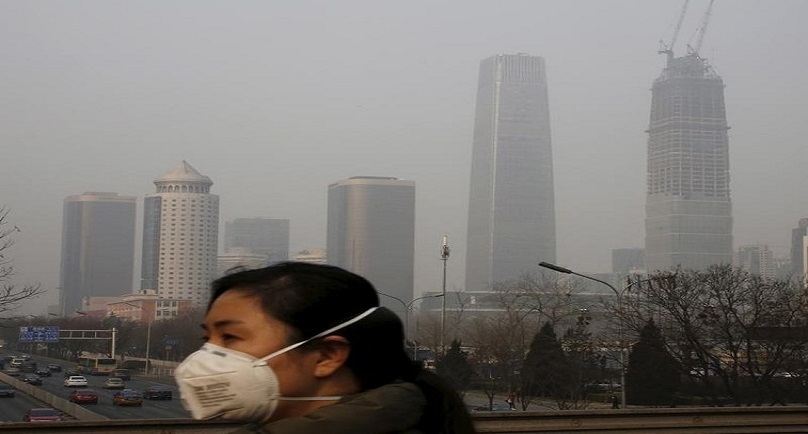Image: A woman wearing a protective mask makes her way in a business district on a heavily polluted day in Beijing, China January 3, 2016. REUTERS/Kim Kyung-Hoon
By Nina Chestney
LONDON (Reuters) – Premature deaths from air pollution will continue to rise to 2040 unless changes are made to the way the world uses and produces energy, the International Energy Agency said on Monday.
Around 6.5 million deaths globally are attributed each year to poor air quality inside and outside, making it the world’s fourth-largest threat to human health, behind high blood pressure, dietary risks and smoking.
Harmful pollutants such as particulate matter – which can contain acids, metals, soil and dust particles – sulfur oxides and nitrogen oxides, are responsible for the most widespread effects of air pollution.
Tiny particulate matter can cause lung cancer, strokes and heart disease over the long term, as well as trigger symptoms such as heart attacks that kill more rapidly.
The release of these pollutants is mainly due to the unregulated or inefficient production and use of energy, the IEA said in a special report on energy and air pollution.
Without action, premature deaths attributable to outdoor air pollution will increase to 4.5 million in 2040 from around 3 million currently. Premature deaths due to household air pollution however, should fall to 2.9 million from 3.5 million.
Asia will account for almost 90 percent of the rise in deaths.
Even though global emissions are forecast to decline overall to 2040, existing and planned energy policies will not be enough to improve air quality, the report said.
“Without changes to the way that the world produces and uses energy, the ruinous toll from air pollution on human life is set to rise,” the IEA said.
Harmful greenhouse gas emissions should continue to fall in industrialized countries and recent signs of decline in China should continue, but emissions are set to rise in India, southeast Asia and Africa as energy demand growth dwarfs efforts to improve air quality.
New energy and air quality policies can deliver cleaner air, however, such as access to clean cook stoves and fuels to replace inefficient biomass stoves; strictly enforced emissions standards for road transport; controlling emissions and switching fuels in the power sector and more energy efficiency in industry.
These measures could ensure global emissions of particulate matter fall by 7 percent, sulfur dioxide by 20 percent and nitrogen oxides by 10 percent to 2040.
As a result, premature deaths from outdoor pollution would fall to 2.8 million in 2040 and from household air pollution to 1.3 million, the report said.
(Editing by Alexandra Hudson)
Copyright 2015 Thomson Reuters. Click for Restrictions.


